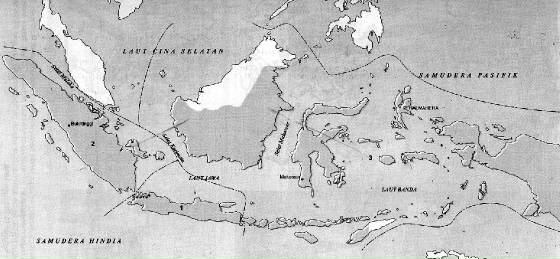|

|
| Japanese occupation zones in Indonesia, 1942-45 |
During theirs invasion days, Japanese proclaimed themselves as 'the old brother' who come to liberate theirs 'Indonesian younger
brother' from the Dutch colonialism. Thus, many Indonesian greet Japanese soldiers as liberators and helped theirs war effort
against the Allied troops. However, the Japanese attitude change drastically after the Dutch surrender.
Actually, the Japanese never wished to foster any kind of Indonesian independence movement in the first place. The last thing
the Japanese wanted was a manifestation of this spirit that might prove unfavourable to their war effort. Hence, after placed
Indonesia under Southern Army Area under Field-Marshal Hisaichi Terauchi, Japanese divided the country into three occupation
zones. Two of them were rule by the Rikugun (the Imperial Japanese Army) under control of 7th Area Army which have HQ in Singapore,
while the last one under the Kaigun (the Imperial Japanese Navy). These are the zones:
1. The 25th Army controlled Sumatra (and Malaya until 1943). At first it's HQ located Singapore before moving to Bukittinggi,
West Sumatra.
2. The 16th Army controlled Java and Madura. It's HQ located in Jakarta (Batavia).
3. Borneo and Eastern Indonesian under the 2nd South Fleet. It's HQ in Makassar.
Each of the military government leas by a military governor (gunseikan). Its office called as Gunseikanbu.
The Japanese run some different policies in those occupation zones. While the Japanese saw that economically Java was not
important enough, but they gave some important glances to it because the number of its population. Beside Java have more modern
political leadership than other parts of Indonesia, where majority of the best educated Indonesian leaders live in Java. Thus
the Japanese tried hard to accommodate some Indonesian nationalist aspirations in this area.
In contrary, the Navy tried to make theirs occupation zone as a part of the Japan Empire. This attitude was share by the 25th
Army that wants to annex Sumatra. The plan itself is not a surprise if we saw that the areas were not only having a few people
but also rich with natural sources, especially oil. Thus these zones administrations were run under a tight Japanese control
to discourage any filtering of nationalist aspiration from Java to the areas.
In theirs attempt to destroyed Western influences, the Japanese prohibit the use of Dutch and English languages and tried
to spread Japan one. However, because war condition and a few of Japan language teachers, Indonesian language was used as
formal language in meetings and schools.
At first, the Japanese gave a free hand to radical groups to attack the ruling class that identified as Dutch collaborators.
However, war made Japanese to choose some priorities. Thus they quickly to reorganized local administration and suppress revolution
seeds that arise in some areas after the fall of the East Indie. So, they decided to use ex-Dutch colonial officials, like
oeleebalang in Atjeh, penghoeloe in West Sumatra, the kings in East Sumatra, and the priyayis in Java.
During theirs rule, the Japanese give more opportunities to Indonesian to served in many high places in bureaucratic than
during the Dutch time. However, as a rule, the vital places were occupied by Japanese themselves. The majority of Indonesian
officials during this time were ex-teachers, including ulemas (religion teacher/preachers). Even the Japanese once appointed
a militant Moslem leader, Kyai Hadj Ajengan Ahmad Sanusi, as vice-resident of Bogor (Buitenzorg) - an interesting phenomena
because it never happen during the Dutch colonial time. It's clear that the Japanese tried to get support from the ulemas
to mobilized the majority Muslims. Thus in late of 1942, the Japanese organized a religion office (Shumubu) in Java.
Meanwhile, political activities fell to an all-time low as from March 1942, all political activities were banned and all existing
associations were dissolved. Only after they were in defensive position in Pacific War, Japanese turn their attention again
to Indonesian nationalists to mobilized Indonesian people for theirs own war efforts.
|



